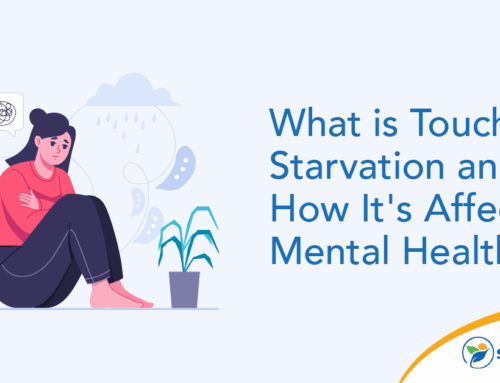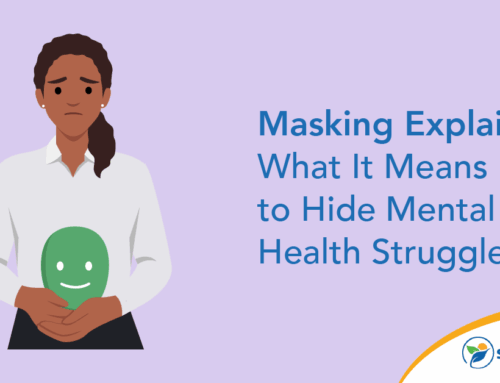What does it mean when someone falls asleep around you? If your significant other is constantly fatigued or drowsy, you might wonder if it’s a normal part of aging or having a busy, stressful life — or if it points to a deeper mental health issue.
Because sleep and mental health are inextricably linked, always falling asleep first is worth addressing, as it might indicate suboptimal mental health. This article covers the relationship between sleep and mental health and offers tips on how to help a loved one whose sleep habits might indicate an underlying problem.
Sleep and Mental Health
Sleep and mental health are closely related, and they have a bidirectional relationship. According to a Harvard study, chronic sleep problems affect 50% to 80% of patients in a typical psychiatric practice but only 10% to 18% of healthy adults in the general population.
Poor sleep can negatively impact your mental health. Conversely, living with a mental health disorder can compromise your sleep quality, particularly if your condition involves anxiety or racing thoughts, both of which are notorious for keeping people awake. The resulting sleep deprivation can worsen your mental health further, causing a vicious cycle.
Sleep deprivation has been found to increase negative emotional responses to stressors and reduce both the number and the strength of positive emotions.
Impact of Sleep on Mental Well-being
Sleep is critical for maintaining optimal health, as it impacts every bodily function, both physical and mental. Poor or inadequate sleep can lead to or worsen mental health disorders, which can negatively impact sleep quality.
It’s critical to get both enough sleep and high-quality sleep, as every stage of sleep, including light sleep, deep sleep and REM sleep, is important for brain health. The different stages within a sleep cycle allow processes in different brain regions to speed up or slow down. This leads to better thinking, learning and memory. If you miss out on just one of those sleep stages, your mental and physical performance could be negatively impacted.
During sleep, the brain works to evaluate and remember your thoughts and the new information it’s taken in throughout the day. It’s also the time your brain declutters itself by purging needless information. Another critical role of sleep in the brain is the consolidation of positive emotional content, a process that doesn’t occur in someone who’s sleep-deprived. This is one reason people with mental health disorders often have low moods and higher rates of depression and suicide attempts.
Sleep helps maintain cognitive skills, including learning and information retention. Poor sleep can impact your ability to handle stress and engage with the world. A person with optimized sleep hygiene is more likely to succeed at work and in their personal life.
Link Between Falling Asleep First and Mental Health
If you’re wondering why your girlfriend or boyfriend always falls asleep, a few studies might interest you. Always falling asleep first could be linked to a mental health issue, but it depends on why your partner is falling asleep. If the issue is tiredness resulting from chronic sleep deprivation, then yes, their constant drowsiness could be indicative of or leading them to a mental health issue.
Research has shown over and over again that improving sleep quality can lead to better mental health outcomes. Studies have found strong causal associations between sleep problems and conditions such as depression and anxiety. A study by the National Institute of Mental Health found a strong association between sleep disturbance and subsequent depression. Of 7,954 adults interviewed, 14% of those with insomnia at the first interview developed new major depression a year later. This number is far higher than the percentage you’d expect from a random sample of healthy adults.
It’s important to remember that the cause-and-effect relationship can work the other way, too. In other words, a mental health disorder might predate sleep quality issues and be a contributing factor.
What Does It Mean When Someone Falls Asleep Around You? Potential Underlying Issues
If someone, such as your significant other, constantly falls asleep around you, there could be several underlying issues. One possible cause is narcolepsy, a sleep disorder that causes excessive daytime sleepiness and sudden sleep onset, even during normal activities such as eating dinner or driving.
Your significant other might also have a circadian rhythm disorder in which their body doesn’t know the proper times it should be asleep versus awake. Other mental and physical conditions that could cause excessive sleepiness and lead to always falling asleep first include sleep apnea and neurological disorders such as Parkinson’s.
If you’re concerned that your significant other is always falling asleep first, you or they should consult a professional at a facility such as Sunlight Recovery to determine the underlying cause and receive appropriate treatment.
Improving Sleep Habits
Sometimes improving your mental health can be as simple as improving sleep habits. Here are a few tips to optimize your or your significant other’s sleep hygiene:
- Set a regular sleep schedule: When you go to bed and wake up at roughly the same time every day, your body learns when it should be tired and when it should be alert.
- Create a relaxing bedtime routine: A relaxing bedtime routine signals to your body that it’s time to wind down.
- Create a sleep-conducive environment: Ideally, this means a comfortable mattress, a dark, quiet room, a cool temperature (shoot for 68 to 70 degrees Fahrenheit) and no distractions or disturbances such as pinging phones.
- Limit screen time before bed: Cut off electronics at least an hour before bed and switch to a paper book.
- Avoid caffeine and sugary foods: Avoid caffeine after lunchtime and sugar within 4 hours of bedtime.
- Exercise regularly: Regular exercise is crucial not only for staying in shape but for burning off excess energy.
Seeking Professional Help
If you’re still concerned about your partner falling asleep around you, it might be time to seek professional help for a possible sleep or mental health disorder. Call Sunlight Recovery today to speak to a compassionate member of our team.






